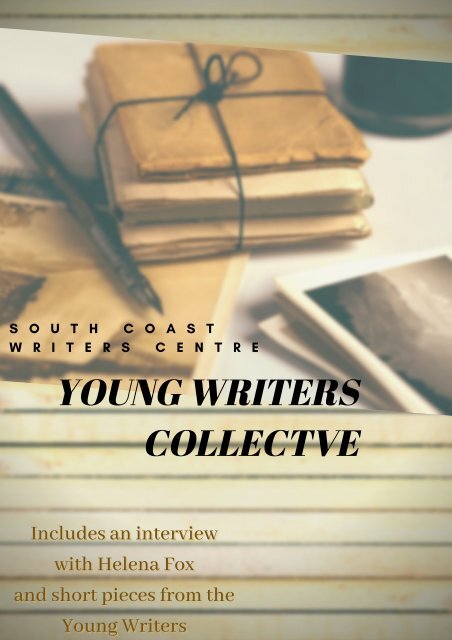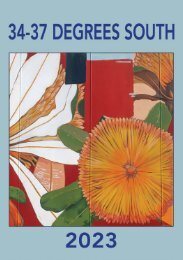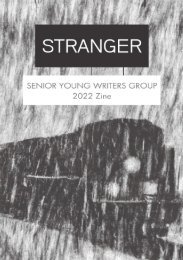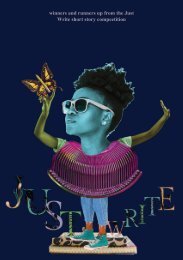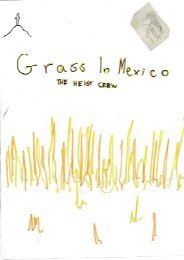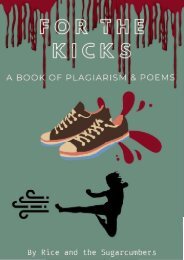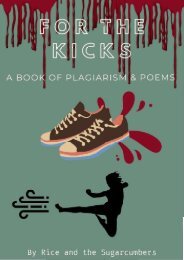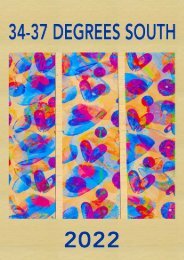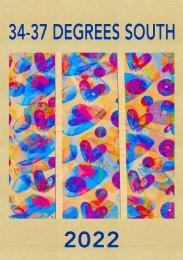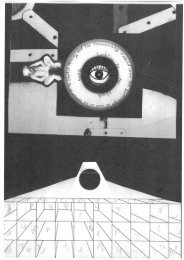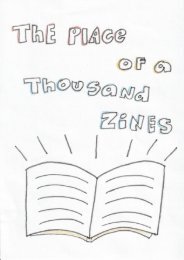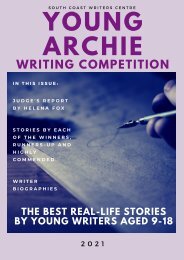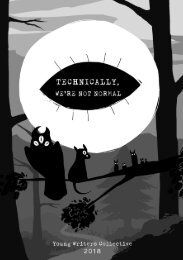Young Writers Collective
You also want an ePaper? Increase the reach of your titles
YUMPU automatically turns print PDFs into web optimized ePapers that Google loves.
S O U T H C O A S T<br />
W R I T E R S C E N T R E<br />
YOUNG WRITERS<br />
COLLECTVE<br />
Includes an interview<br />
with Helena Fox<br />
and short pieces from the<br />
<strong>Young</strong> <strong>Writers</strong>
An Interview with Helena Fox<br />
about the <strong>Young</strong> <strong>Writers</strong> <strong>Collective</strong><br />
by Leon Vasilakis<br />
Helena Fox is the program facilitator of the SCWC <strong>Young</strong><br />
<strong>Writers</strong> <strong>Collective</strong>, a dynamic group of teenagers who meet<br />
throughout the year to write in a variety of genres. Helena has<br />
had a wonderful career in the arts so far, and is a graduate of<br />
the MFA Program for <strong>Writers</strong> at Warren Wilson College in<br />
North Carolina.<br />
Her debut YA novel How it Feels to Float was released in<br />
Australia and New Zealand in 2019 by Pan Macmillan, and<br />
published in North America by Dial/Penguin Random House. It<br />
is a profound, moving tale of living with mental illness, with a<br />
warm-hearted, funny character named Biz. This makes Helena<br />
perfectly positioned to run an amazing series of workshops for<br />
our young writers—so if you’re interested in joining, please<br />
contact the Centre!
I believe the program has helped many young writers grow<br />
more confident about their writing, learn a great deal about the<br />
writing process, and develop unique writing voices. The<br />
program has also provided young writers with many new<br />
experiences, including regularly sharing their work with others,<br />
providing constructive feedback to their peers, having public<br />
readings, and seeing their work published in the annual zine.<br />
The writers have also had a welcoming and safe space to come<br />
to every week, to share their stories and feel heard.<br />
It is very rewarding to see how supportive the Centre is towards<br />
young writers. Not only does the Centre happily provide a yearround,<br />
workshop-based program that offers young writers a<br />
space to gather, share ideas, and build their community, the<br />
Centre also offers many opportunities for young writers to read<br />
their work publicly and publish their work.
The <strong>Young</strong> <strong>Writers</strong> program began mid-2014, with a threemonth<br />
course that focused on various writing forms. Different<br />
tutors ran monthly sessions and Centre staff ran extra support<br />
sessions. At the end of the course, I offered to run out-of-season<br />
workshops until the 2015 program, which ran again with a<br />
similar format.<br />
In 2016, due to the high interest and enthusiasm of the<br />
young writers, the course became a regular, year-long program<br />
of fortnightly sessions run by me, with some guest tutors. In<br />
2017, again due to the eagerness of the young writers, the<br />
program began running weekly. Today, the <strong>Young</strong> <strong>Writers</strong><br />
<strong>Collective</strong> (aged 14 and up) meets throughout the school year to<br />
explore prose, poetry, scriptwriting and non-fiction writing,<br />
and they appear at numerous public readings. The <strong>Young</strong><br />
<strong>Writers</strong> program is thriving; the numbers in the <strong>Collective</strong> are<br />
consistently full, and there is a waitlist.
Helena Fox is a writer and<br />
creative mentor. Born in Peru,<br />
Helena spent time in Spain,<br />
the UK and Samoa throughout<br />
her childhood, settling in<br />
Australia at age eleven, and<br />
gained a Master of Fine Arts in<br />
the United States. She runs<br />
workshops on creative writing<br />
and is proudest of her work<br />
helping young writers find<br />
and express their voice.<br />
Her workshops and her<br />
writing have a focus on<br />
improving mental health.<br />
Helena's novel How it Feels<br />
to Float won the Victorian<br />
Premiers Literary Award for<br />
Writing for <strong>Young</strong> Adults.
I think the program has worked so well because the focus of the<br />
workshops has been on exploring and having fun with writing,<br />
rather than on ‘teaching’ young people how to write. Through<br />
experimentation, discussion, and responding to challenging and<br />
fun prompts, the writers have naturally learnt many important<br />
writing skills. There are no grades or assessments, and there is a<br />
great deal of room for risk taking.<br />
The young writers have become much more comfortable<br />
trying new ideas and sharing their work, and they have<br />
developed powerful and unique writing voices. I think the<br />
program thrives because this is their community. The space is<br />
safe, supportive, and non-judgemental, and from the moment<br />
they step through the door, these talented young people are<br />
seen as writers, sitting amongst fellow writers and learning from<br />
each other.
One of the biggest highlights for me has been watching the<br />
young writers read their work in public and seeing the effect of<br />
their words on the listeners. I also love how every week these<br />
writers blow me away with their sensitive, funny, and<br />
extraordinarily powerful words. I love how they don’t hesitate to<br />
try new ideas. I admire the fearlessness in their writing, and also<br />
how they face their fears in reading their work out to each<br />
other. And I love how much we laugh every week in our little<br />
community space.<br />
I should also mention there is a school-based <strong>Young</strong><br />
<strong>Writers</strong> program offered by the Centre, where tutors go into<br />
schools to run workshop-based sessions for children aged 12-18.<br />
One such program ran very successfully at Albion Park High<br />
School in 2017. The course ran for ten weeks, and the students<br />
explored both short story and poetry writing, creating a great<br />
deal of interesting work over the term. At the end of the<br />
program, the students submitted their favourite work to the<br />
Centre, and Ron Pretty, the poetry tutor, turned it into a book<br />
which was launched by the students at the school.
Responses to the sculpture<br />
'Love' by Alexander Milov<br />
Image reproduced with permission from French photographer<br />
Gerome Viavant (geromeviavant.com)
The architects used your birth certificate as a blueprint: that’s<br />
why your skeleton looks like scaffolding. I see a glimpse of you<br />
behind the robust, never rusting bars. The remnants of your<br />
handprints are on some of your bones, stubborn and refusing to<br />
fade. Did you build this behemoth, or were you trying to<br />
deconstruct? Sometimes, I think you leave a space between your<br />
ribs so I can stick my hand through and hold your heart, only<br />
we never know when the hole will be plastered. Maybe they will<br />
lay the brick, or maybe your fingers will stain the steel.<br />
we were both caged when we met.<br />
you were almost slender enough to slip through your bars.<br />
i wanted your voice to<br />
stroke me like a paintbrush, and i wanted your fingers to lay<br />
against my neck.<br />
(your touch would taste like peppermint).<br />
when you saw me, you wanted me closer. you wanted to<br />
hear me not from a<br />
distance but from that shallow space beside you, chin resting in<br />
that perfect hollow next to your shoulder.<br />
(my voice would sound like silver).<br />
we wanted to slip from that space between ourselves and<br />
admire each other like mirrors. we wanted to move, to touch, to<br />
tangle.<br />
(but we loved our cages too much to break free).
Somewhere, teenage renegades are falling in love to rebel<br />
anthems and watered-down booze, leaving stories in the bottom<br />
of their boots and growing gardens of somedays and maybes,<br />
knowing perhaps they won’t make it but hell if they aren’t going<br />
to try.<br />
Here, it’s different. There’s the same spark, but it’s<br />
breathing in dirt and crying soil, trapped, like them—the<br />
anxious kids who don’t have somedays, who don’t know the<br />
meaning of maybe, only tomorrow, and it’s hanging on by its<br />
fingertips.<br />
The renegades don’t flinch; they paint their skin in wild<br />
colours and cut their hair or their clothes and shout, ‘I’m alive<br />
and I’m young, I tore off the shackles with my teeth.’ While the<br />
anxious kids make friends with the shadows, and fall in love<br />
with one a.m. because they are still bound with phantom<br />
restraints the powerful put there.<br />
Why do the children with black and white actions get to walk<br />
under the golden sun? Why are we putting stickers on the vests<br />
of children who are learning what men already do? Why are we<br />
not encouraging their rebellion, their desires to do what men do<br />
not? Shouldn’t we tell our infants to explore the empty<br />
moments they will soon encounter in Kindergarten? Shouldn’t<br />
we show them the way to dive into their marvellous brains? We<br />
teach our children to swim at a young age so they don’t use<br />
floaties at age twelve. I am approaching adulthood and I am still<br />
learning to breathe through my own thoughts.
Rufus was awoken by the sound of a crying baby. Why the hell<br />
was there a—<br />
Oh, it was his baby. Damn. He’d forgotten about that.<br />
He glanced across at Jodie, lying beside him in the bed on<br />
her stomach, head tilted to the side so he could see her smooth<br />
cheek. They would be married soon, he suspected. Reaching out<br />
to stroke her face, he tried to smile, but as the baby started<br />
bawling again, the smile slowly drooped.<br />
Goddamn. If only his father could see him now …<br />
Rufus glanced at the clock. It was three a.m. Perfect. As the<br />
baby continued to scream, Rufus occupied himself by trying to<br />
plan Jodie’s eighteenth birthday party.<br />
Hidden love<br />
Pregnant? That couldn’t be. Pregnant? Not me. Not with this<br />
child. No.<br />
I slowly lift up my top to see a small bump, seeing the<br />
bruises and scratches littering a canvas that wasn’t meant to be<br />
drawn on. I put my hand on my stomach, stare at myself in the<br />
mirror and put a hand over my mouth to mask the pitiful sobs.<br />
He can’t know. Not now, not ever. For your sake.<br />
*<br />
The day he found out, it was hit after hit.<br />
Then snap. Pain, and that’s how easy it was—you were gone<br />
forever.
Sit under the yellow lights, old man,<br />
That flicker and blink above you.<br />
Consider your life<br />
Lived, and then spent,<br />
As you ride the train to somewhere.<br />
Hunch your shoulders and sigh, old man—<br />
That’s just the world pressing down<br />
On jaded lungs<br />
That stifle fancies of laughter.<br />
Run your hands through your hair, old man,<br />
But don’t let them wander further—<br />
There’s no time to search<br />
For fire or fuel<br />
In this desert of existence.<br />
Pull your collar over your ears, old man.<br />
Ignore the red-coated children<br />
Who giggle uncontrollably<br />
At knock-knock jokes told wrong.
‘YOU ARE THE BEST HOPE FOR THE SURVIVAL OF THE<br />
HUMAN RACE!’<br />
The training camp sergeant roared at his newest recruits.<br />
The two babies were simultaneously screaming for their<br />
mother and wearing two of the deadliest bio-mechanised suits<br />
of armour ever designed. The sergeant began to roar again.<br />
‘STOP SCREAMING LIKE BABIES, AND START FIGHTING FOR<br />
REAL.’<br />
The two babies screamed louder. The sergeant seemed to<br />
realise his screaming was doing little to help, and in a quiet,<br />
kind manner, approached the babies.<br />
One of the babies reached out, the suit mirroring its action,<br />
and closed its fist around the sergeant’s throat. He began to<br />
gasp, then to turn purple, then to gurgle, before finally falling<br />
silent.<br />
The baby giggled.<br />
I used to look deep into her eyes, face to face. These days, it<br />
seems we are more often back to back, refusing to meet each<br />
other’s gaze. I believe in the soul, and I believed ours were<br />
intertwined. Now, though, my soul is like a little child, wobbling<br />
on its undeveloped feet as it once again learns to walk alone.<br />
I sometimes wonder if our souls miss each other. If, behind<br />
my back, mine is reaching out for hers. I sometimes still feel<br />
that gentle touch, the innocence of young love, blissfully<br />
unaware of the reality that is yet to come.
Two broken cages, sitting amidst the lonely company of nature.<br />
Each with their own sorrows. They sit there, abused and beaten.<br />
By whom? By society. The draining days and nights at the office,<br />
all the hard work. For what? Just to get scolded by the boss, cut<br />
by the files and drowned in their own tears.<br />
Where did the magic of life go? Where did the happiness<br />
and joy go? Where did childhood go? When they were young,<br />
they were told that adulthood was something to look forward to,<br />
so they spent all their time wishing that they were grown up, not<br />
fully appreciating childhood.<br />
Amidst the lonely company of nature sit two broken cages,<br />
wishing to be children again.<br />
In the city centre, most preferred death. Humane morality had<br />
developed entirely separately to the surrounding world—an<br />
isolated ecosystem of ideas. Lives spent in such close proximity<br />
that they began to overlap one another, experienced in unison.<br />
The city centre was collapsing, reaching critical mass of flesh<br />
and bone. The pregnant cowered in darkened valleys between<br />
grim battlements, wagering on the life of another. Losing. Their<br />
debts invariably claimed by the detestable flightless vultures<br />
who crawled along the gutters. Abandoned husks piled along<br />
the walls of alleys until wandering shamans came, uttering<br />
benedictions and spreading holy water, dissolving through<br />
flesh, revealing their fractured scaffolding or the unformed<br />
features of those untouched by the scavengers.
I could feel fists beating, bawling, at the insides of my stomach<br />
again, clawing to get out. I fell to the concrete, cried for help.<br />
But no one came.<br />
I heard a sob, echoing up from within. A familiar raw-voiced<br />
plea for freedom.<br />
The little voice would’ve ripped me apart from the inside—kept<br />
clawing until I was bled dry and he’d drowned in the blood, so I<br />
thrust my hand down my throat.<br />
Tiny hands scaled up my arm, nails digging trenches into my<br />
skin.<br />
I vomited the thing up in a scatter of viscera. Smattered with<br />
blood, sitting atop the pile of organs, was an infant, staring up<br />
blindly at the midday sun, smiling.<br />
He was free; I was rid of him. Yet, in that moment, the wind<br />
whistled through me. Inside, I was hollow.<br />
The nuke<br />
It’s been fifty years since they fired the nuke at us. No one<br />
knows why they did. Maybe we shot first. I can’t remember.<br />
All I know is that sometimes, when someone is affected by<br />
it, they just sit there. They just sit side by side and wait to die.<br />
Sure we could help them, but we would be force feeding<br />
them at this point. No one has time for that. Not even me. The<br />
guy who writes these pages for …<br />
Why do I write them?


